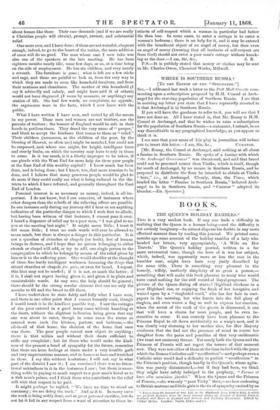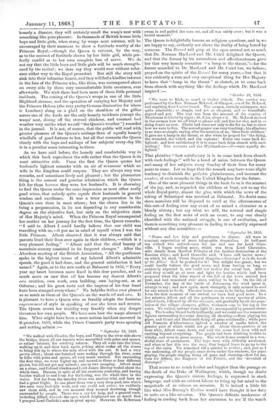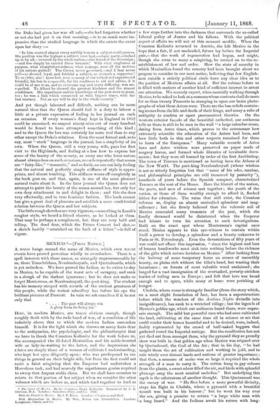BOOKS.
THE QUEEN'S HOLIDAY RAMBLES.* Tim is a very modest book. If any oae finds a difficulty in realizing that the Queen is a human being—and the difficulty is not entirely imaginary—he cannot disperse his doubts in any more effectual manner than by reading this journal. We printed some months ago some account of the holiday rambles of a lady who headed her letters, very appropriately, 'A Wife on Her Travels.' The Queen's holiday journal, written in a far more reverential tone, though the hero of it was her subject, which, indeed, was apparently more or less the case in the humbler case, might have been very justly described by the same title. There is something very pleasant in the homely, wifely, motherly simplicity of so great a person,— something that will make this book pleasant to many who would have cared nothing for the stiff record of Royal progresses. The picture of the Queen dining off starved Highland chickens in a poor Highland inn, or enjoying the freak of her incognita and waited upon by a " ringletted maid," who has her hair in curl- papers in the morning, but who bursts into the full glory of ringlets, and even waves a flag as well to express her emotion, when the secret of the rank of the guests is discovered, is one that 'will have a charm for most people, and be even in- structive to some. It can scarcely have been pleasant to the Princess Royal to sit down accidentally on a wasp's nest, and it was clearly very alarming to her mother also, for Her Majesty confesses that she had not the presence of mind to rescue her daughter from the pains and penalties of that very emblematic (we trust not ominous) throne. Yet surely both the Queen and the Princess of Prussia will not regret the terrors of that moment now. They were not either of them at the time indued with the grace which the Roman Catholics call "recollectiou"—and perhaps even a Catholic saint would find a difficulty in perfect " recollection " in the Princess's position, though hardly in the Queen's, whose agita- tion was purely disinterested,—but if they had been, we think they might have safely indulged in the prophecy, "Forsan et haec olim meminisse javabit." When the Queen and the Princess of Prussia,—she was only "poor Vicky" then,—see how endearing to British matrons and little girls is the tie of sympathy excited by so
L•axcee from Me Journal of -Our Life in the Highlands from 1S48- to 1861, to which are prefixed Extracts front the Same J0711Villi giving an Account of Earlier Visits to ticrtolautirdliaer;pds.TotersaiLt nEttr,g;:iirtihaVarretg, (au, .let Yachting Excursion. Edited by homely a disaster, they -will certainly recall the wasp's nest with something like pure pleasure. In thousands of British homes little
boys and little girls, when stung by wasps next autumn, will be encouraged by their mammas to show a fortitude worthy of the Princess Royal,—though the Queen is reticent, by the way, as to the amount of fortitude shown by her little girl, while per- fectly candid as to her own complete loss of nerve. We do not say that the little boys and little girls will be much strength- ened by the recital ; we dare say they would roar without refer- ence either way to the Royal precedent But still the story will sink into their infantine hearts, and they will feel a kindlier interest in the fate of the Princess who, like them, was encompassed about on every side by these very uncomfortable little creatures, ever afterwards. We wish there had been more of these little personal incidents. The sousing of the Queen's wraps in one of the little Highland streams, mid the operation of carrying her Majesty and the Princess Helena (the very pretty German diminutive for whom is Lenchen) slung on a plaid on the shoulders of the gillies across one of the fords are the only homely incidents (except the wasps' nest, dining off the starved chickens, and constant bad weather very unlike what we call "the Queen's weather ") recorded in the journal. It is not, of course, that the public will read with greater pleasure of the Queen's mishaps than of equally homely windfalls of good fortune to her, but all that connects the Queen closely with the haps and mishaps of her subjects' every-day life is in a peculiar sense interesting to them.
As we have said before, the homely and comfortable way in which this book reproduces the wife rather than the Queen is its most attractive side. From the first the Queen quotes her husband's lightest remarks with an air of reverence which no wife in the kingdom could surpass. They are always very true
remarks, and sometimes lively and pleasant ; but the pleasantest thing is the earnest and genuine admiration which the Queen felt for them because they were her husband's. It is charming to find the Queen under the same impression as most other really good wives, that nobody quite equals their husbands in general wisdom and excellence. It was a truer prepossession in the
Queen's case than in most others ; but the charm lies in its being a prepossession, in its not depending in any considerable degree on the objective fact, but only on the subjective state of Her Majesty's mind. When the Princess Royal accompanied her mother on her journey for the first time, the Queen remarks, "I said to Albert I could hardly believe that our child was travelling with us,—it put me in mind of myself when I was the little Princess. Albert observed thatr it was always said that parents lived their lives over again in their children,—which is a very pleasant feeling." "Albert said that the chief beauty of mountain scenery consisted in its frequent changes." After the Aberdeen meeting of the British Association, "All the gentlemen spoke in the highest terms of my beloved Albert's admirable speech, the good it had done, and the general satisfaction it had caused." Again, as to the new castle at Bahnoral in 1836, "Every
year my heart becomes more fixed in this dear paradise, and so much more so now that all has become my dearest Albert's own creation, own work, own building, own laying-out, as at Osborne ; and his great taste and the impress of his dear hand haye been stamped everywhere." No ladylike italics ever pleased us so much as these of the Queen's on the words all and own. It is pleasant to have a Queen who so frankly adopts the feminine empressement of style in speaking of one she loves and reveres. The Queen avows her timidity very frankly when any danger
threatens her own people. We have seen how the wasps alarmed him. What might have been a more serious incident occurred in September, 1850, while the Prince Consort's party were spearing and netting salmon :—
" September 13, 1850.
"We walked with Charles, the boys, and Vicky to the river side above tho bridge, where all our tenants woro assembled with poles and spears, or rather leistors,' for catching salmon. They all went into the river, walking up it, and then back again, poking about under all the stones to bring fish up to where tho men stood with the net. It had a very pretty effect ; about one hundred men wading through the river, some in kilts with poles and spears, all very much excited. Not succeeding the first time, we went higher up, and moved to three or four different places, but did not get any salmon ; one or two escaping. Albert stood on a stone, and Colonel Gordon and Lord James Murray waded about the whole time. Duncan, in spite of all his exertions yesterday, and having besides walked to and from the Gathering, was the whole time in the water. Not far from the laundry there was another trial, and here we had a great fright. In one place there was a very deep pool, into which two men very foolishly went, and one could not swim ; we suddenly saw them sink, and in one moment they seemed drowning, though surrounded by people. There was a cry for help, and a general rush, including Albert, towards the spot, which frightened me so much that I grasped Lord Carlisle's arm in great agony. However, Dr. Robertson
swam in and pulled the man out, and all was safely over ; but it was a horrid moment."
The Queen is delightfully human on religious questions, and is, we are happy to say, evidently not above the frailty of being bored by sermons. The Record will gasp at the open avowal not so much that Dr. Norman MacLeod and Mr. Caird delighted the Queen, and that the former by his naturalness and affectionateness gave her that very homely sensation "a lump in the throat,"—for the favour accorded to Dr. MacLeod and Mr. Caird has, we believe, preyed on the spirits of the Record for many years,—but that it was evidently a rare and very exceptional thing for Her Majesty to have that "Jump in the throat" at church, or to come back from church with anything like the feelings which Dr. MacLeod inspired :— " October 29, 1854.
"We wont to Kirk, as usual, at twelve o'clock. Tho service was performed by the Rev. Norman McLeod, of Glasgow, son of Dr. McLeod, and anything finer I never hoard. The sermon, entirely extempore, was quite admirable; so simple, and yet so eloquent, and so beautifully argued and put. The text was from the account of the coming of Nicodemus to Christ by night ; St. John, chapter 3. Mr. 'McLeod showed in the sermon how we all tried to please sdf, and live for that, and in so doing found no rest. Christ had come not only to die for us, but to show how we were to live. The second prayer was very touching ; his allusions to us were so simple, saying, after his mention of us, bless their children.' It gave me a lump in my throat, as also when he prayed for the dying, the wounded, the widow, and the orphans.' Every one came back de- lighted; and how satisfactory it is to come back from church with such feelings ! The servants and the IIighlanders—all—were equally de- lighted."
That plaintive "how satisfactory it is to come back from church with such feelings !" will be a bond of union between the Queen and many of her subjects every Sunday of their lives for many years to come. Let us hope that the remark may have some slight tendency to dimiuish the pathetic plaintiveness, and increase the number, of such remarks in the United Kingdom for the future.
One of the most pleasant things in the book to us is the account of the joy, and, as regarded the children at least, not to say the whole Royal party, almost the glee, with which the news of the taking of Sebastopol was received at Balmoral. No doubt some stern moralists will be disposed to cavil at the effervescence of this sort of feeling over any event of so mixed a character as a bloody victory ; but say what we will, the natural and simple feeling on the first news of such an event, to any one closely identified with the national struggle, is one of exultation, and there is something very pleasant in finding it so heartily expressed without any dim moralities :—
"September 10, 1855.
"Mama and her lady and gentleman to dinner. All wore in constant expectation of more telegraphic despatches. At half-past ten o'clock two arrived—one for me and one for Lord Gran- ville. I began reading mine, which was from Lord Clarendon, with details from Marshal Pdlissier of the further destruction of the Russian ships ; and Lord Granville said, I have still better news ;' on which he read, 'From General Siumson—Sevastopol is in the hands of the Allies.' God be praised for it ! 'Oar delight was great; but we could hardly believe the good news, and from having so long, so anxiously expected it, one could not realize the actual fact. Albert said they should go at once and light the bonfire which had been prepared when the false report of the fall of the town arrived last year, and had remained ever since, waiting to be lit. On the 5th of November, the day of the battle of Inkermann, the wind upset it, strange to say ; and now again, most strangely, it only seemed to wait for our return to be lit. The new house seems to be lucky, indeed ; for, from the first moment of our arrival, wo have had good news. In a few minutes Albert and all the gentlemen, in every species of attire, sallied forth, followed by all the serfants, and gradually by all the popu- lation of the village—keepers, gillies, workmen—up to the top of the cairn. We waited, and saw them light it ; accompanied by general cheer- ing. The bonfire blazed forth brilliantly, and we could see the numerous figures surrounding it—some dancing, all shouting ; —Ross playing his pipes, and Grant and Macdonald firing off guns continually ; while poor old Francois d'Albertancon lighted a number of squibs below, the greater part of which would not go off. About three-quarters of an hour after, Albert came down, and said the scene had been wild and exciting beyond everything. The people had been drinking hoalths iii whisky, and were in great ecstasy. The whole house seemed in a won- derful state of excitement. The boys were with difficulty awakened, and when at last this was the case, they begged leave to go up to the top of the cairn. We remained till a quarter to twelve ; and, just as I was undressing, all the people came down under the windows, the pipes playing, the people singing, firing off guns, and cheering—first for me, then for Albert, the Emperor of the French, and the downfall of Sevastopol.'" That seems to us much fresher and happier than the passage on the death of the Duke of Wellington, which, though no doubt expressing the Queen's sincere feelings, is expressed in stock language, and with an evident labour to bring up her mind to the magnitude of so solemn an occasion. It is indeed a little bit like what Miss Burney's Evelina would have thought it her duty to write on a like occasion. The Queen's delicate tenderness of feeling in sending back from her excursion to see 'if the watch
the Duke had given her was all safe,—she had forgotten whether or not she bad put it on that morning,—is to us much more im- pressive than the studied language in which she enters the event upon her diary :—
"In him centred almost every earthly honour a subject could possess. His position was the highest a subject ever had,—abovo party,—looked up to by all,—revered by the whole nation,—the friend of the Sovereign ; —and how simply he carried these honours! With what singleness of purpose, what straightforwardness, what courage, were all the motives of his actions guided ! The Crown never gossessed,—and I fear never will—so devoted, loyal, and faithful a subject, so staunch a supporter ! To us (who, alas ! have lost, now, so many of our valued and experienced friends), his loss is irreparable, for his readiness to aid and advise, if it could be of use to us, and to overcome any and every difficulty, was un- equalled. To Albert be showed the greatest kindness and the utmost confidence. His experience and his knowledge of the past were so great, too ; he was a link which connected us with bygone times, with the last century. Not an eye will be dry in the whole country."
And yet though laboured and difficult, nothing can be more natural than that the Queen should feel it a duty to labour a little at a private expression of feeling in her journal on such an occasion. If every woman's diary kept in England in 1852 could be examined, we suspect ninety-nine out of every hundred would be found to have attempted something of this kind ; and to the Queen the loss was certainly far more real than to any other except the Duke's relatives. Even the most formal and, so to say, most " stock " language in the journal, has a simplicity of its own. When the Queen, still a very young wife, pays her first visit to the Highlands, and feeling at a loss how to express her sense of the beauty of the scenery, as every one who loves nature almost always does on such occasions, records repeatedly that scenes are "fairy-like," "romantic," and so forth, no one can help feeling that the natural and perfectly simple stiffness of style is appro- priate, and almost touching. This stiffness wears off completely as the book goes on, and that, again, is one of the most pleasant natural traits about it. In the later journal the Queen does not attempt to paint the beauty of the scenes around her, but only her own deep attachment to and delight in them ; and this she does very effectually, and in true feminine fashion. The book cannot but give a great deal of pleasure and establish a more confidential relation between the Queen and her subjects.
The little rough sketches are very vigorous,—something in Leech's rougher style, we heard a friend observe, as he looked at them.
That may be perhaps a compliment, but they are very bold and telling. The dead deer, which the Prince Consort had shot,— a sketch hastily "scratched on the back of a letter," —is full of vigour.
































 Previous page
Previous page